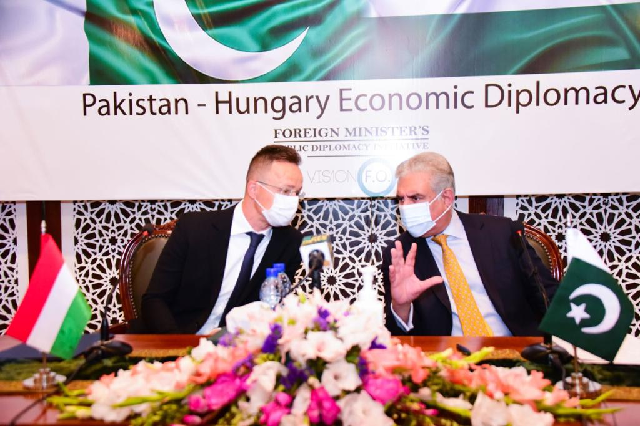Pakistan, Hungary warn of FATF’s political use
Qureshi, Szijjarto agree global financial watchdog should not be used as political tool

Pakistan and Hungary agreed on Friday that the Financial Action Task Force (FATF), a global money-laundering watchdog, should be seen as a technical body rather than a political tool to be used against others.
Speaking at a joint news conference in Islamabad, Foreign Minister Shah Mahmood Qureshi said he and his Hungarian counterpart Peter Szijjarto discussed the FATF and both agreed that this forum should not be used as a political tool against anyone.
"We both agree that it's a technical forum and the objective of this forum ought to be checking money laundering and terror financing, and it should not be used as a political tool," Qureshi said, adding that this was "often" how the body was used.
Qureshi told reporters that Szijjarto was the second foreign minister to raise question about the FATF. Szijjarto said: “The FATF also put Hungary on the grey list for some time. We think these organisations need to take decisions on a technical grounds.”
During the bilateral talks, Qureshi said, both the sides exchanged views on the FATF as how the forum was used and how ought to be used, adding that both sides agreed that the FATF should not be used as political tool, rather only for checking money laundering and terror financing.
While Hungary is placed in middle of Europe, Pakistan at crossroads of South Asia, Central Asia & Middle East has potential to serve as trade, energy & transport corridor. Welcome FM #PéterSzijjártó’s announcement of 🇭🇺 EXIM Bank USD 84m credit line to Pakistan’s businesses. https://t.co/zeXavtN0aS pic.twitter.com/E4ZgdTWljW
— Shah Mahmood Qureshi (@SMQureshiPTI) April 30, 2021
Szijjarto announced that his country has agreed to establish a credit line of $84 million for bilateral business-to-business cooperation and provide another $50 million for tied aid programme, besides offering scholarships to 200 Pakistani students.
“We have established a credit line at Hungarian Exim bank to the extent of $84 million, which is exclusively to serve the enhancement of business-to-business cooperation between Pakistani and Hungarian companies…” Szijjarto said.
“We are ready to provide $50 million for a tied aid credit programme to be launched in Pakistan in the fields of agriculture, water, industry and food processing,” he added. He also said that his government was cooperating with Pakistan on 10 Billion Tree project.
Szijjarto arrived in Islamabad on his maiden official visit at the invitation of Qureshi. It was first visit by a Hungarian foreign minister in 15 years. Qureshi said that the visit during coronavirus pandemic proved Hungary’s interest in strengthening bilateral relations.
Besides one-on-one meetings between the two foreign ministers, both side also held delegation-level talks, in addition to attending a business conference to discuss ways of enhancing bilateral economic cooperation.
Qureshi said Szijjarto was accompanied by representatives from 17 top Hungarian companies, which interacted with Pakistani companies in a matchmaking business to business (B2B) event held under the Economic Diplomacy Initiative.
Both sides also signed a number of memoranda of understanding (MoUs) in the fields of diary production, cyber security, education and others, Qureshi said. He added that Hungary had also expressed interest in starting direct flights to Pakistan.
Üdvözöljük Pakisztánban Minister for Foreign Affairs and Trade, #PéterSzijjártó. Constructive engagements today between our respective business delegations for more meaningful #EconomicDiplomacy. Great to witness signing of partnerships between 🇵🇰 🇭🇺 in dairy, cyber sec & pharma pic.twitter.com/ITx4MvjO4k
— Shah Mahmood Qureshi (@SMQureshiPTI) April 30, 2021
He thanked Hungary for helping Pakistan get the generalised scheme of preferences (GSP)-Plus status in the European Union, which doubled its export to the Europe. The two countries agreed to hold their next round of political consultation in Budapest, he added.
Szijjarto, while reiterating his country’s commitment to fight terrorism and extremist ideologies, said that both the phenomena were the root causes of massive illegal migration to Europe. He added that if the two ideologies were not stopped in Afghanistan, those could pose a threat to Europe.
Therefore, he added, the European Union should support Pakistan in its anti-terror efforts particularly after the pullout of NATO troops from Afghanistan. “Afghanistan should not be allowed to become a safe haven for terrorism and extremist ideologies after the NATO pullout.”
Szijjarto appreciated the role played by Pakistan in the Doha peace process on Afghanistan. In order to extend its physical presence in Pakistan, he added, Hungary had established its consular representation in Karachi.
Foreign Minister Szijjarto also held talks with Adviser to Prime Minister on Commerce Razak Dawood. Later, he called on Prime Minister Imran Khan. During the meeting, Imran underlined the importance of developing a strong economic relationship between Pakistan and Hungary.
He stressed the need for expanding beneficial cooperation in trade, energy, water resource management, food and agriculture, science and technology, and higher education. He urged the Hungarian business community to take advantage of the business friendly climate of Pakistan.
Both sides also exchanged views on the adverse economic impact of Covid-19 pandemic, the Afghan peace process, and other issues of bilateral interest. The prime minister renewed his invitation to Hungarian Prime Minister Viktor Orban to visit Pakistan.
(With input from agencies)



















COMMENTS
Comments are moderated and generally will be posted if they are on-topic and not abusive.
For more information, please see our Comments FAQ